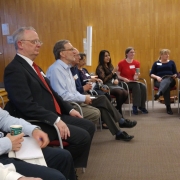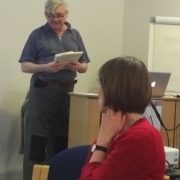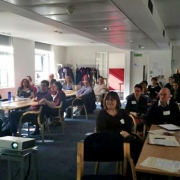September 2017 Seminar: Closing the Loop on Lesson Learning
Summary
Chris Collison explored the myths and truths of lesson-learning in different contexts, using real examples, both good and bad, challenging us to improve this important knowledge-management practice and make it more than a convenient phrase.
‘Lessons learned’ is a phrase that is a regular feature of news bulletins, sports team briefs and project team meetings – but are they really learned, or are they something of a fig leaf for those who carry responsibility?
What does it take to truly invest in lesson learning in a way which closes the loop and results in real change, improvement and risk-avoidance for the future?
• What does a good project review look like?
• What are the most effective questions to use?
• How do we capture the output of a debrief without sanitising the life out it?
• How do we ensure that there is an outcome for the organisation – that something actually happens?
During the syndicate session that followed, groups tried to identify barriers to learning and sharing, and proposed practical ways to both ‘unblock the flow’ and stimulate a thirst for learning.
Speakers
Chris Collison is an independent management consultant and business author with 20 years of experience in knowledge management, facilitation and organisational learning.
His corporate experience comes from long careers in BP and Centrica. He was part of BP’s KM program, a team accredited with generating over $200m of value through pioneering knowledge management. In 2001 he joined Centrica, working at the top levels in Finance and HR, before becoming Group Director of Knowledge and Change Management.
In 2005 he left the corporate world to establish Knowledgeable Ltd. Since that time Chris has been working as a consultant in the field of Knowledge Management and Organisational Learning, and has had the privilege of advising over 130 organizations around the world. Clients range from Shell, Pfizer and the World Bank to the United Nations, the UK Government and the International Olympic Committee.
Chris has worked as an associate or visiting lecturer at a number of business schools: Henley, Cranfield and Liverpool in the UK, Skolkovo in Moscow, Sharif in Tehran and Columbia University in New York. He is a Chartered Fellow of the CIPD.
Time and Venue
2pm on 14 September 2017, The British Dental Association, 64 Wimpole Street, London W1G 8YS
Slides
No slides available for this presentation
Tweets
Blog
See our blog report: Lesson Learning
Study Suggestion
See Chris’s Book Learning to Fly Practical Knowledge Management from Leading and Learning Organisations. C Collison G Parcell, 2007 John Wiley and Sons




